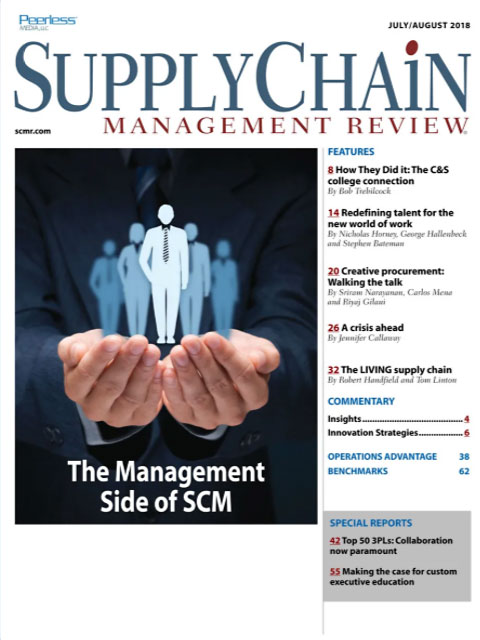Sorry, but your login has failed. Please recheck your login information and resubmit. If your subscription has expired, renew here.
July-August 2018
At Supply Chain Management Review, we’ve been writing about the talent crisis in our profession since at least 2012 when our MIT contributors were publishing a column on talent strategies. Last winter, the topic touched home when I picked up my local newspaper one Saturday morning. One of the lead stories was about two initiatives launched by C&S Wholesale Grocers with two local academic institutions: Keene State College and Franklin Pierce University. Browse this issue archive.Need Help? Contact customer service 847-559-7581 More options
Effectively managing employees within the supply chain can be difficult due to the frequently changing nature of the business. Meeting day-to-day needs often takes higher priority than people management. In its research on organizational processes and performance, APQC recognized that people within an organization play an important role in the effectiveness of their fellow employees. APQC therefore conducted a research study on “People Challenges at Work” that identified the top people issues experienced at organizations today. Management development practices adopted by organizations across industries can provide valuable insight into how supply chain organizations can develop the skills of their managers to both address common people challenges and increase organizational efficiency.
Top people challenges
As part of its “People Challenges at Work” research, APQC conducted a survey of professionals from a variety of organizations to find out the types of people challenges that they encounter. Respondents came from different generations and job levels. For its research, APQC defined people challenges as instances in which the action or inaction of other employees makes it more difficult for an individual to achieve his or her goals. Results from the survey indicate that challenges can be categorized into three groups: communication, planning and interpersonal skills.
As shown in Figure 1, the top two challenges employees face regarding their managers are: the sharing of information and giving direction. Just over half of the individuals responding to APQC’s survey indicated that their manager does not share enough information, which makes it difficult for employees to do their jobs well. Nearly as many individuals feel that their manager does not provide adequate direction regarding their work.

This complete article is available to subscribers only.
Log in now for full access or start your PLUS+ subscription for instant access.
SC
MR
Sorry, but your login has failed. Please recheck your login information and resubmit. If your subscription has expired, renew here.
July-August 2018
At Supply Chain Management Review, we’ve been writing about the talent crisis in our profession since at least 2012 when our MIT contributors were publishing a column on talent strategies. Last winter, the topic… Browse this issue archive. Access your online digital edition. Download a PDF file of the July-August 2018 issue.Effectively managing employees within the supply chain can be difficult due to the frequently changing nature of the business. Meeting day-to-day needs often takes higher priority than people management. In its research on organizational processes and performance, APQC recognized that people within an organization play an important role in the effectiveness of their fellow employees. APQC therefore conducted a research study on “People Challenges at Work” that identified the top people issues experienced at organizations today. Management development practices adopted by organizations across industries can provide valuable insight into how supply chain organizations can develop the skills of their managers to both address common people challenges and increase organizational efficiency.
Top people challenges
As part of its “People Challenges at Work” research, APQC conducted a survey of professionals from a variety of organizations to find out the types of people challenges that they encounter. Respondents came from different generations and job levels. For its research, APQC defined people challenges as instances in which the action or inaction of other employees makes it more difficult for an individual to achieve his or her goals. Results from the survey indicate that challenges can be categorized into three groups: communication, planning and interpersonal skills.
As shown in Figure 1, the top two challenges employees face regarding their managers are: the sharing of information and giving direction. Just over half of the individuals responding to APQC's survey indicated that their manager does not share enough information, which makes it difficult for employees to do their jobs well. Nearly as many individuals feel that their manager does not provide adequate direction regarding their work.
SC
MR


Latest Supply Chain News
Latest Podcast

 Explore
Explore
Business Management News
- AdventHealth named top healthcare supply chain by Gartner
- Unlocking retention: The role employee engagement plays
- Can supply chain managers embrace an entrepreneurial mindset?
- Challenges to ESG reporting
- With capacity to spare, logistics real estate demand remains subdued
- How to improve demand forecasts for new product families
- More Business Management
Latest Business Management Resources

Subscribe

Supply Chain Management Review delivers the best industry content.

Editors’ Picks





